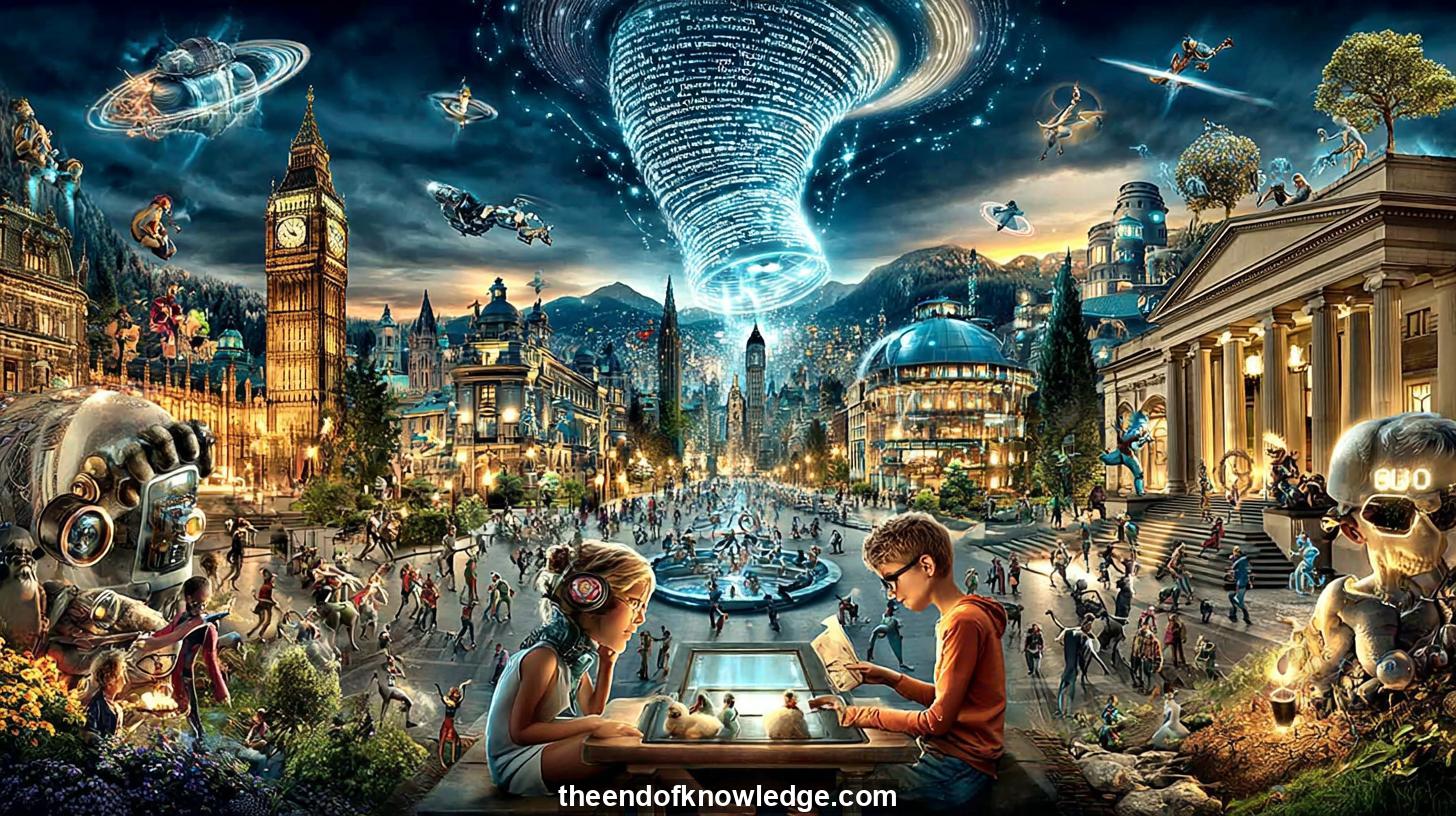🤖⚖️CIUDADANO AELON. CIUDADANO ROBOT | Derechos x Robots Episodio 2⧸4 | Pablo Ruiz Osuna
Concept Graph, Resume & KeyIdeas using Moonshot Kimi K2 :
graph LR
classDef naming fill:#ffd4d4, font-weight:bold, font-size:14px;
classDef policy fill:#d4ffd4, font-weight:bold, font-size:14px;
classDef culture fill:#d4d4ff, font-weight:bold, font-size:14px;
classDef rights fill:#ffffd4, font-weight:bold, font-size:14px;
classDef economy fill:#ffd4ff, font-weight:bold, font-size:14px;
classDef military fill:#ffd4d4, font-weight:bold, font-size:14px;
classDef future fill:#d4ffff, font-weight:bold, font-size:14px;
classDef ethics fill:#ffffd4, font-weight:bold, font-size:14px;
classDef tech fill:#d4d4ff, font-weight:bold, font-size:14px;
Main --> Naming[Aelón replaces robot
to escape slavery. 1]
Main --> Policy[Congress hearings reveal
AI policy ignorance. 2]
Main --> Culture[Japan's culture accelerates
robot integration. 3]
Main --> RightsGroup[Rights & Personhood]
RightsGroup --> Rights[Legal personhood needs
autonomy sensitivity. 4]
RightsGroup --> RobotRights[Robot rights differ
from human. 5]
Main --> EconomyGroup[Economic Impact]
EconomyGroup --> Property[Robots gain property
via autonomy. 6]
EconomyGroup --> UBI[UBI counters workforce
displacement. 7]
Main --> MilitaryGroup[Military Ethics]
MilitaryGroup --> Military[Military robots create
ethical dilemmas. 8]
MilitaryGroup --> Augmented[Augmented humans risk
new inequality. 9]
Main --> FutureGroup[Future Perspectives]
FutureGroup --> Clarke[Clarke's laws warn
against tech dismissal. 10]
FutureGroup --> Narratives[Narratives shape AI
public acceptance. 11]
Main --> PopGroup[Pop Culture Influence]
PopGroup --> PopCulture[Pop culture reflects
AI ethics. 12]
PopGroup --> Consciousness[Consciousness definition
remains elusive. 13]
Main --> TechGroup[Emerging Technologies]
TechGroup --> Xenobots[Xenobots blur life
boundaries. 14]
TechGroup --> Necrobotics[Necrobotics revives dead
matter with AI. 15]
Main --> HumanGroup[Human Enhancement]
HumanGroup --> Cyborgs[Cyborgs merge biology
with tech. 16]
HumanGroup --> Transhumanism[Transhumanism debates
enhancement limits. 17]
Main --> CityGroup[Urban Systems]
CityGroup --> SmartCities[Smart cities need
systemic redesign. 18]
CityGroup --> BCI[Brain-computer interfaces
decode memories. 19]
Main --> RealityGroup[Reality Questions]
RealityGroup --> Simulation[Simulation theory questions
reality authenticity. 20]
RealityGroup --> Quantum[Quantum computing taps
non-local universes. 21]
Main --> AIGroup[AI Safety]
AIGroup --> Alignment[AI alignment demands
ethical architecture. 22]
AIGroup --> Singularity[Self-improving AI risks
uncontrollable singularity. 23]
Main --> DangerGroup[Existential Risks]
DangerGroup --> Replication[Self-replicating AI
surpasses nuclear danger. 24]
DangerGroup --> Energy[Energy scarcity could
bottleneck AI growth. 25]
Main --> RegulationGroup[Global Regulation]
RegulationGroup --> Europe[European regulation lags
behind US China. 26]
Main --> SocialGroup[Social Integration]
SocialGroup --> Social[Social robots combat
loneliness dementia. 27]
SocialGroup --> Emotional[Emotional bonds mirror
human relationships. 28]
Main --> CoexistGroup[Future Coexistence]
CoexistGroup --> Humanity[Humanity evolves narratives
for coexistence. 29]
CoexistGroup --> Contract[Future social contract
includes non-humans. 30]
class Naming naming
class Policy policy
class Culture culture
class Rights,RobotRights rights
class Property,UBI economy
class Military,Augmented military
class Clarke,Narratives future
class PopCulture,Consciousness ethics
class Xenobots,Necrobotics,Cyborgs,Transhumanism,SmartCities,BCI,Simulation,Quantum,Alignment,Singularity,Replication,Energy,Europe,Social,Emotional,Humanity,Contract tech
Resume:
The conversation opens with host Plácido Doménech celebrating the success of the first episode of the XHabay XTalks series featuring Pablo Ruiz Osuna, which became the most-watched X-Talk on the channel. They highlight the upcoming second episode titled “Ciudadano Aelón,” framing it as a deliberate shift from “robot” to “Aelón” to shed the historical connotation of slavery. They preview the depth of the dialogue, promising to explore current events, legal theory, and the emergent ethical landscape surrounding artificial entities.
Domínez and Ruiz discuss the recent US congressional hearings on AI, expressing concern over the superficiality and apparent lack of preparation among lawmakers. They contrast this with the rapid advancements in robotics and AI witnessed in Japan and China, emphasizing how cultural narratives—such as the Japanese notion that “everything has a soul”—facilitate smoother integration of intelligent machines into society. The hosts argue that Western anthropocentrism and fear-based narratives impede progress and reinforce outdated power structures.
Central to the debate is the question of legal personhood: if and when an autonomous system with self-learning, self-perception, and sensitivity should be granted rights. Ruiz outlines his thesis that rights must evolve alongside capabilities; a robot capable of economic autonomy, owning property, or paying taxes should be recognized as a citizen-like entity. They examine parallels with animal rights, noting how moral status has historically been granted incrementally and often reluctantly.
The dialogue then turns to the practical and existential implications of these ideas. Universal basic income is proposed as a societal response to large-scale automation, while the speakers warn of widening inequality between augmented humans and the “unaugmented.” They explore military applications of autonomous weapons, acknowledging the moral hazard of sending machines to fight in lieu of humans, yet recognizing geopolitical pressures that make such developments almost inevitable.
Finally, the hosts reflect on the narrative dimension of AI. Drawing on Blade Runner, Ex Machina, and Westworld, they argue that stories shape public perception and policy. They close with a call for humility and open-mindedness, invoking Arthur C. Clarke’s dictum that any sufficiently advanced technology is indistinguishable from magic. The episode ends with an invitation to the audience to engage, share, and prepare for a future where human and artificial intelligences coexist as co-citizens.
30 Key Ideas:
1.- Aelón replaces robot to escape slavery connotation.
2.- US Congress hearings reveal policy ignorance on AI.
3.- Japan’s cultural acceptance accelerates robot integration.
4.- Legal personhood hinges on autonomy and sensitivity.
5.- Robot rights must differ from human rights.
6.- Economic autonomy allows robots to own property.
7.- Universal basic income counters workforce displacement.
8.- Military robots raise ethical deployment dilemmas.
9.- Augmented humans risk creating new inequality.
10.- Clarke’s laws warn against dismissing future tech.
11.- Narratives shape public acceptance of AI.
12.- Pop culture reflects and influences AI ethics.
13.- Consciousness definition remains philosophically elusive.
14.- Xenobots blur organic and artificial life lines.
15.- Necrobotics revives dead matter with AI.
16.- Cyborgs merge human biology with technology.
17.- Transhumanism debates human enhancement limits.
18.- Smart cities require top-down systemic redesign.
19.- Brain-computer interfaces decode and implant memories.
20.- Simulation theory questions reality’s authenticity.
21.- Quantum computing taps non-local universes.
22.- AI alignment demands ethical architecture.
23.- Self-improving AI risks uncontrollable singularity.
24.- Self-replicating AI surpasses nuclear danger.
25.- Energy scarcity could bottleneck AI growth.
26.- European regulation lags behind US and China.
27.- Social robots combat loneliness and dementia.
28.- Emotional bonds with machines mirror human relationships.
29.- Humanity must evolve narratives for coexistence.
30.- Future social contract includes non-human citizens.
Interviews by Plácido Doménech Espí & Guests - Knowledge Vault built byDavid Vivancos 2025
 >
>